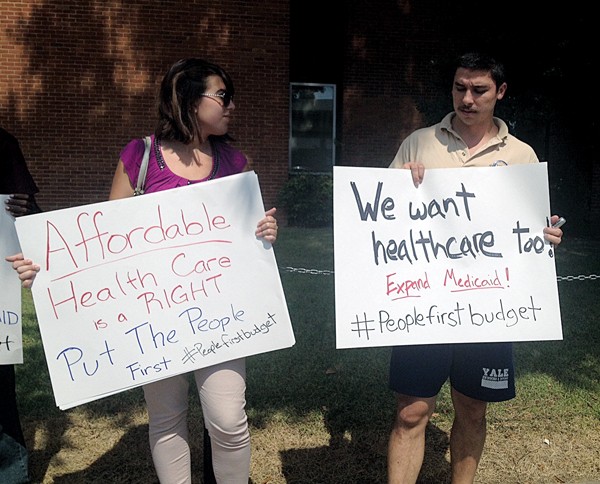When Le’Trice Donaldson was a graduate assistant (GA) at the University of Memphis, she was diagnosed with breast cancer. But because the university doesn’t offer health coverage to GAs, and her income from the university was only $900 a month, Donaldson wasn’t sure how she would afford medical care.
“The first thing that came to my mind after my diagnosis was, ‘How am I going to pay for this?'” Donaldson said.
Luckily, Donaldson qualified for a TennCare loophole that only applies to breast cancer patients. But not every GA is so fortunate when he or she gets sick. Around 25 percent of
 Bianca Phillips
Bianca Phillips
United Campus Workers demand Medicaid expansion during Bill Haslam’s recent visit to Memphis.
U of M GAs have no health insurance.
Additionally, those whose stipends fall below $11,490 per year don’t qualify for Medicaid or for subsidies through the Affordable Care Act (ACA). Had Governor Bill Haslam chosen to expand Medicaid after the ACA was passed, those GAs would have access to health coverage subsidies through the ACA Marketplace.
Now, United Campus Workers has begun putting pressure on the university to provide health insurance to GAs and the state to expand Medicaid.
GAs are employees of the university. While they attend classes toward their own graduate degree, they’re also teaching classes for undergrads or working in research labs.
Since they’re working at the university, their tuition is waived, and they receive a stipend, but the amount of that stipend differs by department. Some make less than $11,000 a year and others top out at $18,000.
They’re not allowed to hold additional outside jobs because, according to Interim Dean of the U of M Graduate School Jasbir Dhaliwal, “they are full-time students, and we want them to focus on their studies.”
Josh Dohmen, a GA in the philosophy department, helped compile a report on how other schools handle insurance for GAs. Of the U of M’s academic peers (schools that are comparable to the U of M based on academic accomplishment), 75 percent offer full health coverage to GAs. Of the U of M’s funding peers (schools with similar financial resources), 50 percent provide full coverage. The University of Tennessee system provides health coverage as part of their GAs’ stipends.
Dohmen’s report, which was compiled last academic year, also surveyed U of M students about their personal health insurance situations — 25.1 percent of the
U of M’s GAs were uninsured; 37.2 percent were on a parent or spouse’s plan; 22.1 percent were on a U of M student plan (but as of this academic year, that student plan no longer exists); and 15.6 percent had coverage under the ACA.
“We brought that report in to the administration of the Graduate School, and we were told that we shouldn’t be asking the university for funding, but that we should be putting pressure on the state to fund the university better,” Dohmen said. “I think it’s the case, if they wanted to, they could give health insurance to their GAs. But if that is legitimately not the case and I’m wrong, they need to be the ones putting pressure on the state. They have lobbyists in Nashville.”
Dhaliwal said, “In a perfect world, we certainly would like to provide health insurance.” But he said funding for GAs is limited.
“If we were to start offering health insurance, the number of GAs we could have would be less,” Dhaliwal said. “We feel there’s a shortage in the community for advanced degrees, and we’re trying to provide as much education as possible to as many people as possible.”
Dohmen said United Campus Workers will continue to pressure the university and the state. Just last week, outside the Shelby County Health Department while Haslam was in Memphis getting a flu shot, they held a protest to demand the state expand Medicaid.
“I plan to take my report [on how other schools handle health coverage] to the administration of the University of Memphis,” Dohmen said. “And I am in talks with University of Tennessee-Knoxville to draft a statewide letter saying [health coverage] is what we need. We need to raise awareness to folks making financial decisions for the state.”